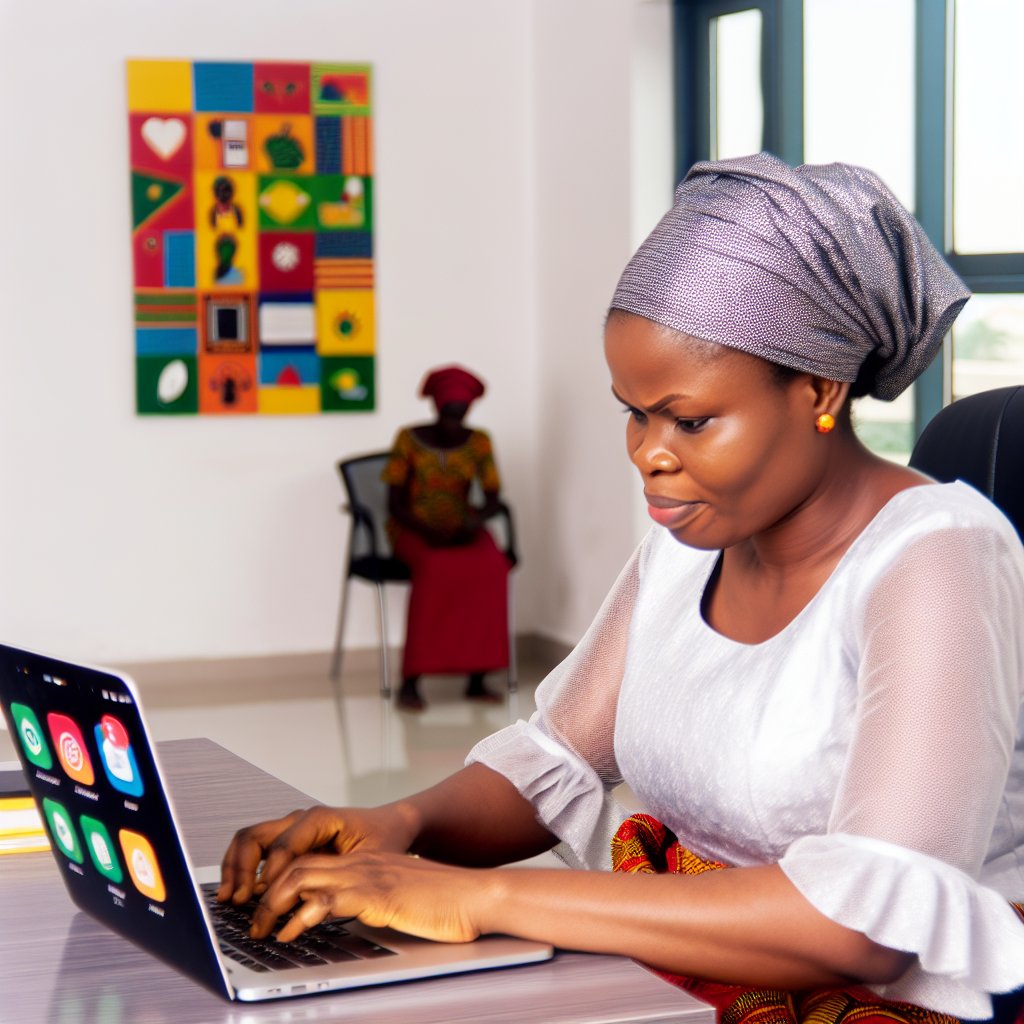Understanding Localization
Definition of Localization
Localization involves adapting an app for a specific market.
This process includes language translation and cultural adjustments.
It ensures the app is relevant to local users.
Importance of Localization
Localization enhances user experience significantly.
It helps users feel connected to the app.
Moreover, it fosters trust and loyalty among users.
Differences Between Localization and Globalization
Localization focuses on specific markets, while globalization targets a broader audience.
Both processes are essential for app success.
However, effective localization can lead to greater user engagement in specific regions.
Benefits of Localization for Nigerian Users
Nigeria’s diverse languages require careful localization.
Adapting apps for languages like Hausa, Yoruba, and Igbo is crucial.
It also respects local customs and practices.
Furthermore, this approach addresses unique user needs and preferences.
Challenges Involved in the Localization Process
Localization can be complex due to cultural nuances.
Understanding local slang and expressions is vital for success.
Unlock Your Unique Tech Path
Get expert tech consulting tailored just for you. Receive personalized advice and solutions within 1-3 business days.
Get StartedAdditionally, technical constraints can pose challenges in the process.
Companies need to invest time and resources for successful localization.
Strategic Importance of Localization in Nigeria’s App Market
Emphasizing localization can lead to a competitive edge.
As Nigerian app markets grow, effective strategies are essential.
Incorporating localization ensures relevance and success in the market.
The Diversity of Languages in Nigeria and Its Impact on App Design
Overview of Nigerian Linguistic Diversity
Nigeria boasts over 500 languages.
This showcases its rich cultural heritage.
This linguistic diversity greatly influences communication styles.
Communication styles vary across regions.
Major languages include Hausa, Yoruba, and Igbo.
However, many other languages also exist.
For app developers, understanding this variety is vital.
Effective localization depends on this understanding.
Importance of Language in User Engagement
Language is essential for user engagement.
Unlock Premium Source Code for Your Projects!
Accelerate your development with our expert-crafted, reusable source code. Perfect for e-commerce, blogs, and portfolios. Study, modify, and build like a pro. Exclusive to Nigeria Coding Academy!
Get CodeLanguage also affects user satisfaction.
Apps that resonate with local languages attract more users.
As a result, users feel a deeper connection to the app.
Moreover, localized content leads to higher retention rates.
Creating Multilingual Interfaces
Designing multilingual interfaces enhances usability.
This improvement benefits diverse audiences.
Developers must prioritize flexible layout designs.
The layouts should accommodate various scripts.
Integrating switchable language options improves accessibility.
Testing interfaces in multiple languages ensures a seamless experience.
Adapting Cultural Contexts and References
Localization goes beyond simple word translation.
It requires adapting cultural references and idioms.
Understanding local traditions enriches app relevance.
This understanding includes local practices.
For example, integrating local holidays can enhance user interest.
Challenges in Localizing for Nigerian Languages
Localizing for Nigerian languages poses challenges.
Limited resources for less widely spoken languages hinder efforts.
Variations in dialects may confuse the target audience.
Developers must strive for consistency across dialectical differences.
Prospects for App Localization in Nigeria
The future of app localization in Nigeria looks promising.
As technology advances, localization tools will improve.
Awareness about the importance of language will continue to grow.
Successful localization can lead to greater market expansion.
Cultural Relevance: Adapting Content for Nigerian Audiences
Adapting content for Nigerian users is essential for app success.
This process starts with understanding the diverse cultures within Nigeria.
Nigeria is home to over 250 ethnic groups.
Each ethnic group has unique traditions.
For instance, the Yoruba, Igbo, and Hausa groups have distinct languages and customs.
Knowing these differences helps developers tailor their content effectively.
Language Considerations
Language plays a crucial role in localization efforts.
While English is widely spoken, many users prefer content in their native languages.
Incorporating languages like Yoruba and Hausa can enhance user engagement.
Furthermore, using local slang and expressions makes the content relatable.
This approach builds trust and fosters a sense of community among users.
Cultural References
Understanding local cultural references can significantly impact user experience.
Using familiar idioms, proverbs, and anecdotes resonates well with audiences.
For example, referencing popular Nigerian music or movies can engage users.
Moreover, using culturally relevant imagery enhances visual appeal.
This strategy ensures that users connect emotionally with the content.
Celebrating Local Events
Incorporating local holidays and events into app content is vital.
Nigeria has numerous cultural celebrations, such as Eid, Christmas, and Nigeria’s Independence Day.
Highlighting these events can attract users during festive periods.
Additionally, you can create themed promotions or features around these occasions.
This tactic not only boosts engagement but also fosters community spirit.
User Feedback and Iteration
Gathering user feedback is essential for continual improvement.
Engaging with Nigerian users helps identify their preferences and needs.
Platforms like surveys and social media can provide valuable insights.
Acting on this feedback leads to more relevant and appealing content.
Iteration based on feedback ensures that the app stays fresh and engaging.
Find Out More: Mobile App Development Trends That Are Revolutionizing Nigerian Industries
User Experience Enhancements Through Localization Techniques
Understanding User Needs
Localization helps apps meet the specific needs of Nigerian users.
Nigerians value relevant content that resonates with their culture.
Understanding local languages enhances communication within the app.
Apps tailored to the community foster user trust and loyalty.
Cultural Relevance in Design
Cultural elements enhance the overall user experience.
Designing with local customs in mind creates meaningful interactions.
For instance, color choices reflect cultural significance.
Moreover, incorporating local symbols can promote connectivity.
Language Localization
Language choice greatly affects user engagement.
Offering multiple local languages caters to diverse user groups.
This flexibility ensures that everyone feels included.
Translating content accurately preserves the original message.
Improving Accessibility
Localization aids in making apps more accessible.
Consideration of local dialects enhances usability for different demographics.
This approach caters to users with varying levels of language proficiency.
Furthermore, using visual aids supports comprehension for all users.
Feedback Mechanisms
Establishing feedback channels encourages user interaction.
Users can express their cultural preferences through surveys and reviews.
This feedback informs ongoing improvements in the app.
Consequently, users feel valued and heard.
Strategies for Market Penetration in Nigeria
Effective localization strategies boost market penetration in Nigeria.
Aligning with local trends allows apps to capture more users.
Consequently, brands can gain a competitive edge in the market.
Continuous adaptation to user preferences keeps apps relevant.
Explore Further: The Rise of Mobile Apps in Nigeria: Key Skills to Build Market-Leading Apps
Case Studies: Successful Localized Apps in Nigeria
Flutterwave: Revolutionizing Payments
Flutterwave has transformed digital payments in Nigeria.
The app caters to local needs by supporting Naira transactions.
Users enjoy a seamless experience with local payment methods.
Consequently, businesses benefit from increased sales.
Jumia: Bridging E-commerce and Local Culture
Jumia successfully integrates local products into its platform.
The app features items that resonate with Nigerian consumers.
Moreover, it offers multiple language options to enhance user experience.
This approach fosters trust and boosts customer loyalty.
Paystack: Enhancing Online Transactions
Paystack simplifies online transactions for Nigerian merchants.
The app supports local banking options, making payments easy.
Additionally, it provides detailed analytics for business growth.
This tailored experience resonates well with the Nigerian market.
WhatsApp: A Communication Giant
WhatsApp’s localization efforts cater specifically to Nigerian users.
The app supports multiple languages, including Pidgin English.
This feature encourages user engagement and inclusivity.
As a result, WhatsApp remains one of the most popular messaging platforms.
Infinix: Adapting Mobile Technology
Infinix focuses on the needs of Nigerian smartphone users.
It integrates local apps and services to enhance usability.
Furthermore, the company tailors its marketing strategies for local audiences.
This localized approach strengthens brand loyalty among consumers.
Find Out More: Building FinTech Apps for Nigerians: Flutter Made Simple

Challenges of Localization: Technical and Social Barriers
Technical Barriers
Localization involves complex technical processes.
Many developers struggle to implement these processes.
First, developers often face difficulties in adapting user interfaces to local languages.
Text expansions and adjustments in layout design are common challenges.
Secondly, integrating payment systems that cater to local currencies presents another challenge.
Proper testing across various devices ensures functionality.
Many developers overlook the need for responsive design.
Responsive design can adapt to different screens effectively.
Social Barriers
Social and cultural differences pose significant challenges to effective localization.
Understanding local customs and communication styles is essential for user engagement.
Content that resonates with global audiences may not appeal to Nigerian users.
Humor and references must align with local cultural contexts.
Language diversity in Nigeria requires precise translation services.
Nuances of various dialects must be correctly conveyed.
Effective Approaches to Overcoming Localization Barriers
Developers can adopt several strategies to address localization challenges.
Collaborating with local experts during development is beneficial.
Employing native speakers for translations enhances accuracy and authenticity.
Utilizing localization tools can streamline workflows and reduce errors.
These tools often provide in-depth cultural insights to improve user experience.
Conducting user research can gather valuable feedback on localized content.
Such proactive measures significantly enhance app relevance for Nigerian users.
See Related Content: Build Stunning Mobile Apps: A Guide for Nigerian Coders
The Role of Local Developers in App Localization
Understanding the Importance of Local Developers
Local developers play a critical role in app localization.
They understand cultural nuances that affect user experiences.
Additionally, they are familiar with local languages and dialects.
This expertise enhances the overall relevance of applications.
Fostering Bridging Gaps Between Global Standards and Local Needs
Local developers bridge the gap between global app standards and local expectations.
They tailor content to resonate with Nigerian users effectively.
Moreover, their insights ensure compliance with local regulations.
This approach helps brands resonate with their target audience.
Collaboration with International Teams
Local developers often collaborate with international development teams.
This partnership results in culturally appropriate solutions.
They provide localized feedback that can reshape app functionalities.
Furthermore, this collaboration enhances user engagement in the Nigerian market.
Case Studies of Successful Localization Efforts
Several successful apps owe their relevance to local developers.
- For instance, an e-commerce app that adopted local payment methods thrived.
- A popular messaging app integrated local vernacular phrases for better communication.
- Another app revamped its marketing strategy based on local preferences.
These examples demonstrate the power of effective localization.
Challenges Faced by Local Developers
Despite their expertise, local developers face challenges.
Limited resources can hinder effective localization efforts.
Additionally, they often contend with outdated technology.
Language barriers can also pose significant hurdles.
Prospects for App Localization Growth in Nigeria
The future looks promising for localization in Nigeria.
As mobile usage surges, so does the demand for localized apps.
Local developers will play an even larger role in this growth.
Continued investment in their skills will further enhance app relevance.
Future Trends: Localization Strategies for Emerging Technologies in Nigeria
Embracing Mobile Technology
Mobile technology continues to experience rapid growth in Nigeria.
Many Nigerians access the internet primarily through mobile devices.
Localization in mobile apps becomes vital for user engagement.
Developers should prioritize localized content and user interfaces.
Incorporating local languages enhances accessibility for more users.
Leveraging Augmented Reality
Augmented Reality (AR) is gaining traction in the Nigerian market.
This technology has the potential to transform various sectors.
From education to retail, localized AR applications can create unique experiences.
For instance, educational apps can use local examples to enhance learning.
Retail AR applications can showcase products in culturally relevant contexts.
Artificial Intelligence and Machine Learning
Artificial Intelligence (AI) and Machine Learning (ML) are shaping the tech landscape.
Localizing AI-driven applications requires understanding cultural nuances.
Developers should train AI models on local dialects and colloquialisms.
This adaptation improves user interaction and satisfaction.
Furthermore, it fosters trust and credibility among Nigerian users.
Connecting through E-commerce Platforms
E-commerce continues to rise in popularity across Nigeria.
Localized platforms can cater to the specific needs of Nigerian consumers.
Content, payment methods, and delivery options should reflect local preferences.
Offering local dialect options can further enhance user experience.
Moreover, targeted marketing strategies can influence purchasing decisions.
Social Media Engagement
Social media plays a significant role in Nigerian communication.
Localized content on social media fosters community engagement.
Brands should tap into trending topics and local events.
Utilizing influencers can help spread messages effectively.
Authenticity in localized content enhances brand loyalty.
Collaboration with Local Developers
Partnering with local developers provides valuable insights.
These collaborations often lead to better localization strategies.
Local developers understand cultural nuances and user preferences.
Furthermore, leveraging their networks can enhance app visibility.
Investing in local talent strengthens the tech ecosystem as a whole.
Additional Resources
Data protection laws in Nigeria




